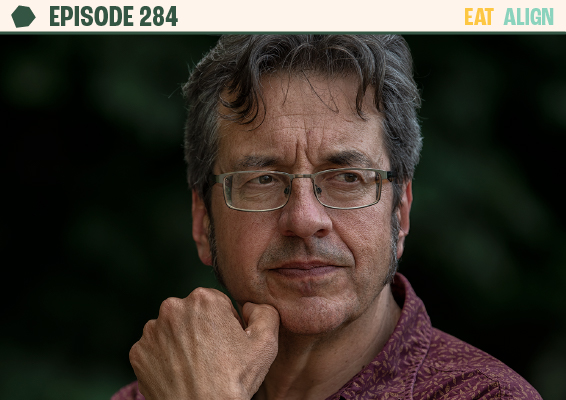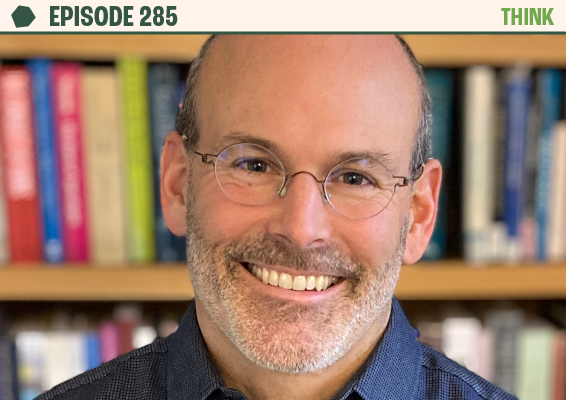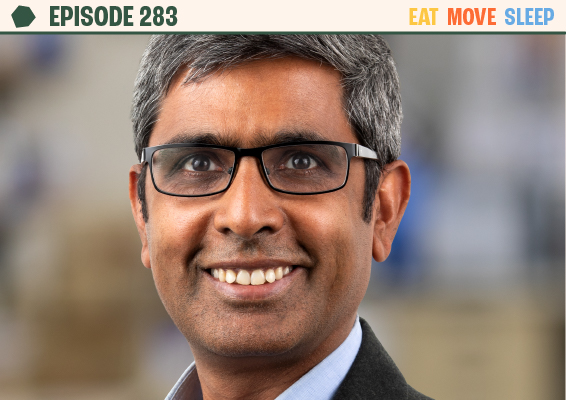One of the most common arguments put forward for an animal-based diet is that beef, when farmed “holistically”, actually combats climate change. And while almost everyone would agree that factory-farmed beef is a terrible thing, what if George Monbiot told you that “the only thing worse than feedlot beef is grass-fed beef”? In Episode #284, I sit down with environmental activist and author George Monbiot to take a critical lens to regenerative agriculture and carbon offsetting.
“I see this as possibly the world’s most successful greenwash operation ever launched. This is greenwash and climate denial on a massive scale.”
George Monbiot is a celebrated environmental activist, Guardian columnist, and bestselling author known for challenging mainstream views on sustainability. Among his notable books, Regenesis: Feeding the World without Devouring the Planet critically examines the impact of food systems on the environment. He’s made waves in the digital space with viral videos, including a collaboration with Greta Thunberg on Natural Climate Solutions, garnering over 60 million views. His 2013 TED Talk, “How Wolves Change Rivers”, highlighting nature’s delicate balance, has been viewed over 40 million times. Aside from his literary contributions, Monbiot has also explored musical narratives, co-creating the concept album Breaking the Spell of Loneliness with musician Ewan McLennan.
“Cattle ranching is among the greatest threats to life on earth. It’s the driving force of much of the world’s habitat destruction, of desertification, and indeed of very major greenhouse gas emissions.”
In this episode, we address George Monbiot’s recent debate with Allan Savory, hosted at Oxford University. As George breaks down his stance on regenerative beef, we cover carbon storage and carbon sequestration, the importance of land for wild ecosystems, and what would happen if the whole world switched to grass-fed beef. You’ll also learn about the problem with carbon credits and carbon offsetting and the government-level change that needs to happen to combat this issue.
Specifically, we discuss:
- Introduction (00:00)
- Who is Allan Savory? Exploring the “Is Livestock Grazing Vital for Climate Change Mitigation?” Debate (01:22)
- The Environmental Impact of Beef Consumption: Allan Savory’s Claims and Evidence (05:39)
- The Flaws in Allan Savory’s Supporting Studies (13:26)
- Soil Carbon Saturation and Greenhouse Gas Emissions (18:05)
- The Distinction Between Carbon Storage and Carbon Sequestration (21:04)
- Misunderstandings Surrounding Carbon Credit Schemes (26:17)
- Identifying Genuine Carbon Offset Programmes (33:04)
- Overlooking Carbon Opportunity Costs: Common Misconceptions (34:28)
- Debunking the Myth: Is Carbon Opportunity Cost a Grand Deception? (41:26)
- Is It Too Late for Climate Change Reversal? (52:03)
- Allan Savory’s Assertions in Light of Contrary Evidence (57:54)
- George Monbiot Reflects on the Calibre of His Debate with Allan Savory (1:09:20)
- Livestock Farming and Farmer Revenues: Dispelling Myths (1:12:21)
- George Monbiot Shares His Sentiments on the Degradation of the Natural World (1:20:15)
- Why It Matters: The Imperative to Care (1:22:50)
- Outro (1:24:27)
It’s a pleasure to have had George on the show again to address an ideology that is so deeply rooted in our culture. If you missed his first episode on The Proof, addressing food, politics, and the environment, make sure to listen to it here. I hope you walk away from this episode better equipped to navigate the food landscape and have meaningful conversations about regenerative beef. As George says: “There are eight billion human reasons to care and then there’s billions of other natural reasons to care as well. And if we cease caring, we give up on ourselves. We give up on humanity.”
You can find a comprehensive database of George Monbiot’s work on his website, https://www.monbiot.com/, which encompasses his journalistic work and books. Get his book ‘Regenesis’ here. Connect with him on Twitter/X, Instagram, and Threads. Search “George Monbiot” on YouTube to find a wealth of videos like his short film with Greta Thunberg, this TED Talk, and this fascinating video about wolves and the balance of nature.
Optimise your health with InsideTracker’s biomarker analysis. Get exclusive access to InsideTracker’s new ApoB test, and a significant discount at insidetracker.com/simon.
The best way to support the show is to use the products and services offered by our sponsors. To check them out and enjoy great savings, visit theproof.com/friends.
Enjoy, friends.
Simon
More about George Monbiot
George Monbiot is an author, Guardian columnist and environmental activist. His best-selling books include Feral: Rewilding the land, sea and human life, Heat: how to stop the planet burning, and Out of the Wreckage: a new politics for an age of crisis. George cowrote the concept album Breaking the Spell of Loneliness with musician Ewan McLennan, and has made a number of viral videos. One of them, adapted from his 2013 TED Talk, How Wolves Change Rivers, has been viewed on YouTube over 40m times. Another, on Natural Climate Solutions, that he co-presented with Greta Thunberg, has been watched over 60m times. George’s latest book, Regenesis: Feeding the World without Devouring the Planet, was published in May 2022.







